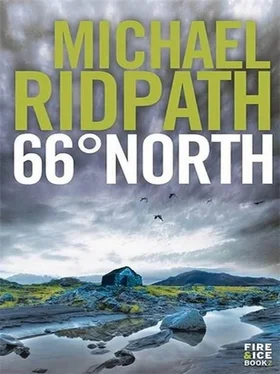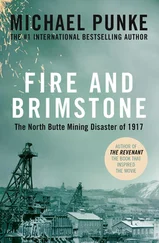‘Why not?’
‘Look, you’re obsessed, Magnus. And that was cool when you were asking questions in America. But I can’t handle you dredging up all that shit in Bjarnarhöfn again. That’s buried and it’s buried for a reason.’
‘Ollie?’
‘I’ve spent most of my life, over twenty years, trying to forget that place, and you know what? I’ve just about done it. So as far as I am concerned it should stay forgotten.’
‘But Ollie-’
‘And if you do find stuff out, just don’t tell me about it, OK?’
‘Look, Ollie-’
‘Bye, Magnus.’
Five minutes later, the phone rang again. It was Ingileif, asking him round to her place. She would cook dinner.
‘Are you OK?’ she asked when he got to her flat. ‘Something’s wrong.’
‘Just got a phone call from my brother.’
‘What’s up with him?’
‘I told him what we found out over the weekend. About our father. And grandfather.’
‘And?’
‘And he wants to think about it even less than I do.’
Magnus could see Ingileif about to say something and thinking the better of it. ‘Yes?’ he said.
‘Sorry,’ Ingileif said. ‘I can see it’s a sensitive subject for you. And your brother. I can live with that.’
‘Good.’
Ingileif was frying some fish. ‘I got an offer today,’ she said.
‘What kind of offer?’
‘You remember Svala? From the gallery?’
‘Yes. Didn’t you say she has moved to Hamburg?’
‘That’s right. She’s teamed up with some German guy. They are selling Scandinavian stuff. Their gallery has only been open a couple of months, but she thinks it will do well.’
‘Even in the recession?’
‘Apparently. And Germany isn’t as badly screwed as Iceland is. They are coming out of it there.’
‘Lucky them.’
‘Yes. Anyway, she wants me to join them. As a partner. She’s told this German guy that I am just what they need for the business to take off.’
‘Hmm.’ Ingileif had her back to Magnus. ‘Sounds like a good opportunity. But what about the gallery here?’
‘I’d miss it. But the prospects have to be much better in Germany.’
‘Do you speak any German?’
‘A bit. Enough to get me started. I could pick it up pretty quickly if I’m living there.’
Magnus felt his body tense. ‘So are you going?’
Ingileif didn’t answer as she scooped the fish on to plates, and placed them on the table. They sat down.
‘No,’ she said.
‘No? Why not?’
She leant over and kissed him. Deeply. ‘Because of you, stupid.’
There wasn’t much Magnus could say to that. He smiled.
‘How’s the case going?’ she asked. ‘Any new suspects?’
‘A couple,’ Magnus said. ‘Do you know Sindri Pálsson?’
‘That old windbag? Yes, I do.’
‘Why am I not surprised? But he can’t be a client.’
‘Oh, no. He’s part of Iceland’s version of a liberal intelligentsia. He shows up to book launches. Exhibitions. He’s a nice guy, despite all the “world-is-ending” crap.’
‘He seems to believe that violence is the only way to destroy capitalism.’
‘He’s all talk. He’s a big pussy cat. You don’t think he killed Óskar, do you?’
‘We think he might be involved.’
‘No,’ Ingileif said. She paused, thinking. ‘No. He’d never kill anyone. I can always ask him.’
‘I already have,’ said Magnus.
‘Yes, but he might tell me.’ Ingileif chewed her fish. ‘I’m serious. I’m pretty sure he fancies me. In fact I’d say he fancies anyone under the age of thirty – and Magnús, as you know, I am still under the age of thirty.’ Ingileif was twenty-nine and three-quarters. ‘He’d tell me if I asked him in the right way.’
‘And I’m serious,’ Magnus said. ‘It would screw up the investigation.’
‘Oh, don’t be so bureaucratic. It would be kind of fun. I could solve your case for you.’
‘No, Ingileif,’ Magnus said. ‘No.’
Several hours later, they were lying in Ingileif’s bed. Magnus couldn’t sleep. He was facing away from her. He could sense she was awake also.
He felt her touch his shoulder.
‘Magnús?’
‘Yes?’
‘Are you thinking about Bjarnarhöfn?’
‘Yes.’
She tugged at his shoulder so he rolled over on to his back. She kissed his lips gently. ‘Tell me. If you want to.’
‘OK.’ Magnus swallowed. ‘OK. I will.’
And so he told her.
January 1986
Magnus slipped out of the farmhouse into the cold fresh air, and stumbled through the snow towards the sea. He had to be alone.
It was night. They had just eaten and Grandpa was giving Óli a lecture about wetting his bed.
Christmas hadn’t been so bad. The boys’ uncle, aunt and cousins had visited from Canada to the delight of their grandfather. Grandpa had entered one of his phases of exuberant high spirits. There was Christmas cheer everywhere. The Yule Lads had come, placing little gifts in Magnus and Óli’s shoes.
Christmas Eve dinner was a feast to remember: ptarmigan, browned potatoes fried in butter and sugar, which were Magnus’s favourite, followed by leafbread and ice cream. Magnus received an American police car with sirens and flashing lights from his Canadian uncle and aunt. A touch babyish perhaps, but he liked it. Óli, for the first time for months, seemed to be actually enjoying himself.
Then, as Magnus knew it would, things had soured. Óli got scared again and had started wetting his bed. Just after New Year the relatives had left, leaving the boys alone in the farmhouse with their grandparents.
And Grandpa was in an evil mood.
Magnus trudged past the little church down to the sea and sat on a stone. He scanned the familiar isolated lights, which burned nearly all day at this time of year, when dusk and dawn brushed in the gloom of midday. The bright lights of the farmhouse behind him. The lights at Hraun on the other side of the lava field. The lighthouse on one of the islands in the fjord. The bobbing winks of fishing boats returning to Stykkishólmur.
It was a clear night. The reflection from the half moon glimmered on the snow, and shimmered in the waterfall streaming off the fell looming behind the farmhouse. The tall triangular racks for drying stockfish were silhouetted against the gleaming swell of the sea, which rustled gently against the shore. Twisted stone reared up out of the white Berserkjahraun. A gleam of green hovered behind the mountains away to the north of the fjord. The aurora. And high above all this, the stars, pricking the cold clear night in their thousands. He remembered his mother telling him when they still lived in Reykjavík that there were two things in the world that could not be counted: the stars in the night sky and the islands in Breidafjördur.
Magnus hunched into his coat. He was cold, really cold, but the cold felt good compared to the angry heat inside the farmhouse.
Two years before, Magnus, Óli and his mother and father had all been living happily together in their little house in Thingholt with the blue corrugated iron roof and the whitebeam tree in the garden. Then things fell apart. There was arguing, anger, his father’s departure, his mother sleeping all the time, forgetting to get them dinner, not being able to speak properly. Within six months Magnus’s father was in Boston, his mother was in Reykjavík and Magnus and his little brother were at their grandparents’ farm at Bjarnarhöfn.
Magnus had never much liked his grandmother. She was a small woman, cool, detached, with a permanent look of mild disapproval on her face. His grandfather was scary but had a certain gruff charm. He would throw himself into playing games with his grandsons, and once they moved up to Bjarnarhöfn, took great pleasure in showing them the farm, the fells, the islands in the fjord. What Magnus and Óli enjoyed most was helping him collect the valuable feathers from the eider ducks’ nests among the dwarf willows by the stream.
Читать дальше












